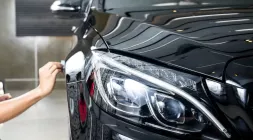4 most common signs for bad car water pump
The car’s water pump plays a vital role in keeping it in great running condition. Any damage to it can affect how your vehicle works.
Every single part of your vehicle is put there by the makers for a reason. Each of those parts, regardless of the size, performs a particular function that allows your vehicle to work the way it should.
That’s why it’s a good idea to always be on the lookout for parts that are wearing out or breaking down. They may not interest you enough at first glance but if any of the parts fail, that can contribute to the decline of your vehicle’s performance.

Water pumps plays a vital role in keeping it in great running condition
A good example is the water pump. Like most parts of your vehicle, this also plays a vital role in keeping it in great running condition. That means any damage to it can affect how your vehicle works.
Not only that, but a faulty water pump can also wear out other parts in your vehicle. If left for longer with continued use, you may have to spend more than the actual water pump. Let’s know more about the car water pump and what you need to know about it in this article from Philcarnews.com.
What is a Water Pump and How Does it Work?
Once you run your vehicle’s engine, the coolant sitting in the radiator gets woken up. It is then brought into the water pump’s center. Then, the crankshaft powers the impeller of the water pump.
This then circulates the coolant through the entire engine. The process is somewhat similar to how the heart pumps blood and distributes it all over the body.

The water pump also plays a vital role in keeping it in great running condition
The fluid is then propelled thanks to the vanes or pump blades. This then goes into the engine block and the cylinder head. After that, it flows and enters the radiator.
Then, it goes into the water pump. This cycle is repeated over and over by up to thousands of times per minute. When this process doesn’t happen as it should, the engine will overheat.
Bad Water Pump Symptoms
An overheating engine is only a few revs away from complete engine failure. Any car owner knows that any engine problem is equal to a lot of problems. The big repair cost is given.
But if there are broken parts that need replacement, that’s another spend. That’s why it’s vital to understand how even a minor part like a water pump works. This way, it’s easier to recognize its early signs of failure:
1. Elevated Coolant Temperature
One of the most obvious signs that there is something wrong with the water pump is overheating. An overheating engine should be indicated by the dedicated engine temperature warning icon.
If you’re not familiar with this, it’s the one with wavy lines on it. Depending on your vehicle, an engine temperature reading can be displayed instead.
A water pump's job is to cool down the engine. It does its job by circulating the coolant around the moving parts of the engine. So, if the water pump is defective, the engine will overheat and reach unsafe temperatures.
Note that there are vehicles with temperature gauges that won’t budge until the engine temperature is already at a dangerous level. So, you also need to pay attention to the gauges. Once it passes the acceptable operational temperature, it may mean trouble.
>>> Related: 5 car parts that are particularly damaged by potholes

An overheating engine should be indicated by the dedicated engine temperature warning icon
2. Radiator Steam
This is a scenario that you may have already seen in movies. Steam coming from the engine compartment is never a good sign and can mean big problems. Whether your vehicle is moving or at a halt, a steaming engine is bad news.
If the water pump doesn’t work like it’s supposed to, the coolant wouldn’t be able to circulate properly. The end result is, as you may have expected, an overheating engine.
=
If you’re on the road and you see steam from the engine compartment, pull over safely
If you’re on the road and you see steam from the engine compartment, pull over safely. If you continue to drive with a steaming engine, irreversible damages may occur. And you know what that means, more financial allotment for your car.
But keep in mind that an overheating engine isn’t an immediate indication of a bad water pump. Other problems like a bad radiator can also be the root cause of the problem.
If it’s a small leak you got in your hands, you can add coolant and be on your way to the mechanic. But if it’s a big one, you will most likely need to have your vehicle towed.
>>> Related: Tips to Maintain Exhaust Emission Systems You Need to Know

Steam coming from the engine compartment is never a good sign and can mean big problems
3. Unusual Sounds
If you hear unnatural squealing, buzzing or whining sounds, check it out right away. This could be a sign that the accessory belt is loose. Cases like these are usually caused by worn out bearings or loose pulley. If the bearings end up in your vehicle’s water pump, you need to replace it entirely.
One of the common reasons why water pumps fail is because of accessory belts that are too tight. If you want to DIY the water pump replacement, we suggest buying a belt tension gauge.
This will ensure that the tension is at the correct level. If there’s a whining sound that gets louder when accelerating, it should be checked by a mechanic immediately.

If you hear unnatural squealing, buzzing or whining sounds, check it out right away
4. Fluid Leak
A bright orange or green pool under the vehicle after being parked for hours could be coolant. This happens when the water pump seals and gaskets crack, wear out or break apart. Even if there is no puddle of coolant under your vehicle, you should still take a look at the water pump.
If there’s more debris on that part compared to everywhere else in the engine bay, it could be coolant. A trickle of coolant can end up drying outside the water pump. This creates solidified debris. It can also be caused by corrosion or rust.
Some leaks only happen when the pump is turning. A sample scenario is when the vehicle is running. There are also leaks that can occur when the vehicle is off. The latter, however, is usually caused by a faulty radiator and not a bad water pump.
>>> Related: 5 telltale signs indicating the need to replace the damper

Some leaks only happen when the pump is turning
RECENT ARTICLES









